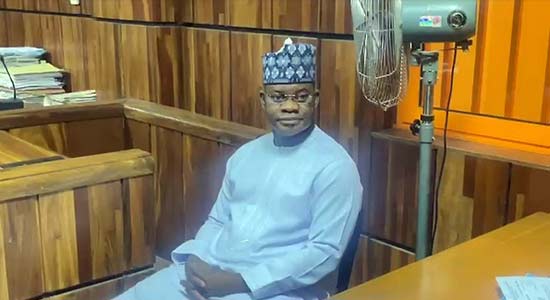The trial of former Kogi State Governor, Alhaji Yahaya Bello, resumed on Wednesday as the Economic and Financial Crimes Commission (EFCC) presented additional witnesses before the High Court of the Federal Capital Territory (FCT), Maitama.
Bello, who governed Kogi State from 2016 to 2024, is standing trial alongside two officials of the state government — Umar Shuaibu Oricha and Abdulsalami Hudu — on a 16-count charge bordering on money laundering and criminal breach of trust involving ₦110 billion.
Testifying as the third prosecution witness (PW3), a bank official, Ms. Williams Abimbola, narrated her knowledge of the transactions linked to the case.
Abimbola, a Compliance Officer with the United Bank for Africa (UBA), told the court that all cash withdrawals involving her bank followed due process and that no banking regulations were violated.
She confirmed that she had earlier given similar testimony before the Federal High Court in Abuja in another case between the Federal Republic of Nigeria and Bello, marked FHC/ABJ/CR/98/2024. However, she clarified that she was not the manager of the Kogi Government House account, which was domiciled in Lokoja.
While being cross-examined by Bello’s lead counsel, Chief J. B. Daudu, SAN, the witness explained that her role as a compliance officer was to protect the bank’s integrity and ensure adherence to legal and regulatory standards.
Referring to the exhibits tendered before the court, Abimbola confirmed multiple cash withdrawals made by one of the defendants, Hudu, including several transactions of ₦10 million each between July 31 and August 6, 2019.
She stated that she could not confirm the purpose of the withdrawals, noting that while banks often query high-volume transfers, cash withdrawals are typically exempted from such scrutiny.
According to her, “A banker does not act as an internal auditor for customers. So long as the payment mandate is correct, a customer is at liberty to withdraw their funds.”
The witness further testified that the bank did not breach any regulation regarding the transactions and that none of the withdrawals exceeded ₦10 million.
Earlier, she identified the signatories to the Kogi Government House account as of 2004 as Christopher Enefola (Permanent Secretary), Onekutu Daniel (Chief Accountant), and Abdulsalami Hudu (Accountant). She also referenced a letter dated September 2008 bearing the signatures of Elder P.S. Ocheni, Abbas Ibrahim Abubakar (Chief Accountant), and Hudu Abdulsalami (Senior Accountant).
During cross-examination by counsel to the third defendant, Mr. A. M. Aliyu, the witness acknowledged that some credit entries in the account were labeled “Governor’s Security Fund,” including two tranches of ₦50 million each.
When asked if she could confirm whether the funds were used for security purposes, she replied, “My Lord, I am not privy to the details of the transaction and cannot categorically answer that question.”
After Abimbola was discharged, the EFCC called its fourth witness, Jesutoni Akoni, a Compliance Officer with Ecobank, who appeared before the court pursuant to a subpoena.
After Abimbola was discharged, the EFCC called its fourth witness, Jesutoni Akoni, a Compliance Officer with Ecobank, who appeared before the court pursuant to a subpoena.
Before Akoni began his testimony, the defense objected to the admissibility of a 13-page document he intended to rely on, arguing that it was addressed to Justice Emeka Nwite of the Federal High Court, where another case involving Bello is pending. Following the objection, EFCC counsel, Mr. Kemi Pinheiro, SAN, withdrew the cover letter.
In his evidence, Akoni told the court that he did not know the three signatories to the account opened with his bank and that Hudu’s name did not appear as one of the signatories.
Meanwhile, Bello’s counsel, Daudu, SAN, informed the court that his client had filed an application challenging the court’s jurisdiction to hear the case. He urged the judge to take the application first, noting that it could save the court’s time and resources.
“I urge your Lordship to give us a date to address the issue of jurisdiction once and for all,” Daudu pleaded.
However, the EFCC counsel opposed the application, insisting it was not yet ripe for hearing.

